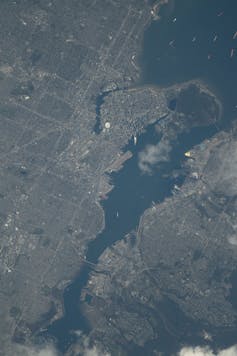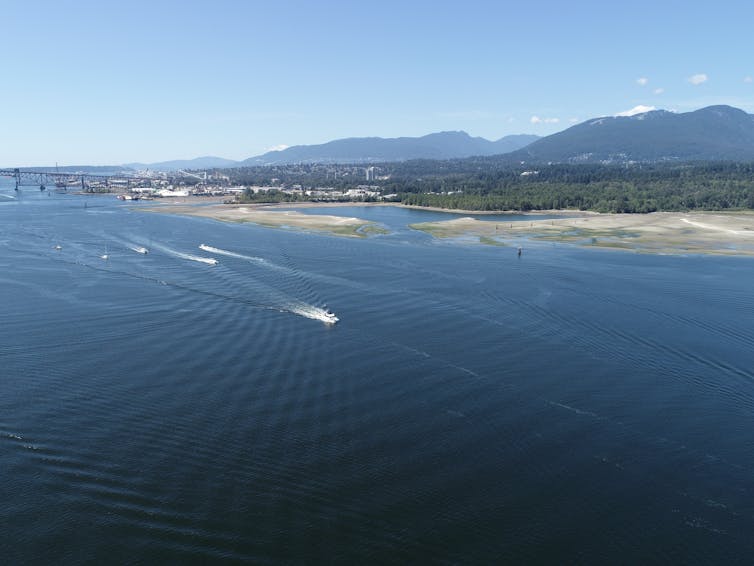Source: ForeignAffairs4
Source: The Conversation – Canada – By Meaghan Efford, Postdoctoral Research Fellow, Institute for the Oceans and Fisheries, University of British Columbia
Burrard Inlet, known traditionally as səl̓ilwəɬ (Tsleil-Wat) in the hən̓q̓əmin̓əm̓ language, has been the heart of the traditional, ancestral and unceded territory of the səl̓ilwətaɬ (Tsleil-Waututh Nation) since time immemorial.

(NASA)
The inlet is a water system that wraps through and around what we now know today as the city of Vancouver on the coast of British Columbia. The ecosystem is home to essential habitat for species like Pacific herring, Pacific salmon and harbour seals.
Burrard Inlet is also host to many commercial, industrial and urban developments and interests. This includes the Port of Vancouver, one of the largest marine ports in Canada and the terminal end of the Trans Mountain Pipeline. Today, more than 2.5 million people call the area home and it’s a popular tourism spot.
This is relatively new, however. Colonization and urbanization have caused intense change and damage since Europeans first settled in the area in around 1792, with most changes occurring since the 1880s.
Through a collaborative research project between the Tsleil-Waututh Nation, the University of British Columbia, engineering consultant firm Kerr Wood Leidal and Mitacs Canada, we assessed the impact of colonization on the Burrard Inlet ecosystem since Europeans first settled in the area.
When we look at the cumulative effects of specific events, we are adding the individual impacts of each event together to get a fuller picture of how colonialism impacted the ecosystem.
How we tracked change over time
We chose four sources of stress to the ecosystem to assess for this research:
1) The impact of smallpox on the ancestral Tsleil-Waututh population and the resulting health of the inlet.
2) The impact of settler fisheries, including Pacific salmon and Pacific herring.
3) The impact of settler hunting on land animals, including deer.
4) The impact of urbanization on the health of the ecosystem.
We used an ecosystem modelling software program called Ecopath with Ecosim, and modelled how these events impacted the inlet ecosystem between 1750-1980. We found there was a significant decrease in biomass (how much of a given organism is in an ecosystem) and available habitat.
We focused on 12 animal groups based on another collaborative project that focused on traditional Tsleil-Waututh diets.
To do this, we drew on multiple sources of data, including Tsleil-Waututh traditional ecological knowledge, archeological data, historical and archival work and ecological resources.
By combining these different sources of information, we can address gaps in each data source and weave together information to paint a fuller picture of ecological change over time.

(Tsleil-Waututh Nation)
What we found
Our research highlights how shoreline change from events like the construction of the Port of Vancouver resulted in the loss of more than half of the intertidal habitat that clams, crabs, birds and fish rely on.
Along with over-harvesting, this has resulted in a dramatic population decline for these species. Clams and other bivalves have also become unsafe to eat due to pollution.
Over-fishing has been a huge problem. Forage fish, including Pacific herring, eulachon, surf smelt and Northern anchovy, collectively experienced a 99 per cent decline in biomass.
Pacific herring was completely wiped out by dynamite fishing, and only recently returned.
Pink salmon and chum salmon both experienced more than 40 per cent losses in biomass due to over-fishing. White sturgeon were almost wiped out.
Mammals didn’t fare any better: three-quarters of the deer and elk populations and over one-quarter of the harbour seal population in the area around the inlet were lost to hunting.
Smallpox had a devastating effect on Salish communities throughout the region. The loss of lives caused dramatic change in the ecosystem because it reduced how much food was taken out of the ecosystem significantly.
The smallpox epidemics only touch the surface of how colonization impacted Indigenous lives. Other events that we didn’t include in the model — like the Residential School system and the Reserve System, for example — severely limited or criminalized stewardship activities that Tsleil-Waututh and other Nations have been using to take care of their territory for millennia.
Tsleil-Waututh stewardship and sovereignty
Tsleil-Waututh people are specialists in managing and stewarding the marine, tidal and terrestrial resources of the inlet’s ecosystem. Tsleil-Waututh salmon stewardship sustainably maintained a chum salmon fishery for almost 3,000 years.
The research questions, priorities and direction of our project were established through frequent collaborative meetings. This approach ensured Tsleil-Waututh co-authors and colleagues were involved in every step of the research.
This kind of community-driven work is complex. It is also incredibly valuable for understanding ecosystem change over time. Without the leadership and knowledge of Tsleil-Waututh knowledge-holders, this research would have had massive data and knowledge gaps and the work would have much less significance.
This is an example of transdisciplinary research: research that is interdisciplinary, that draws on multiple disciplines for data and methods and is grounded in community from the beginning.
Our research shows that colonialism has had a devastating impact on habitats and biodiversity in and around Burrard Inlet. This is not just an ecological story, but a human story that speaks to the wide-reaching impacts of colonization. It is an intertwined story that shows how harmful colonization and rapid urbanization can be, both to humans and to the ecosystems we call home.
![]()
Meaghan Efford received funding from Mitacs Canada through a collaborative project with Tsleil-Waututh Nation.
– ref. Colonization devastated biodiversity, habitats and human life in the Pacific Northwest – https://theconversation.com/colonization-devastated-biodiversity-habitats-and-human-life-in-the-pacific-northwest-260791
